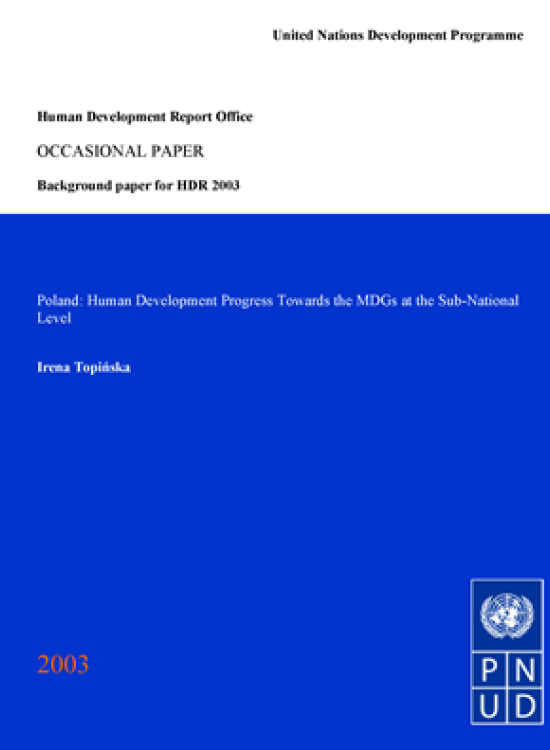Poland: Human Development Progress Towards the MDGs at the Sub-National Level

Download Report by Language
Document
poland2003.pdf
(458.34 KB)
Citation
Topinska, Irena. 2003. Poland: Human Development Progress Towards the MDGs at the Sub-National Level. New York.
Poland: Human Development Progress Towards the MDGs at the Sub-National Level
Posted on: January 01, 2003
The study intends to provide a variety of indices which may give a solid ground for the evaluation of human development progress. Generally, it uses target indicators recommended for Millennium Development Goals (MDGs), but these indicators are somewhat adjusted to the Polish case. Poland is a relatively developed country as measured by such indices as GDP per capita or HDI. It is a member state of the OECD and a candidate member for the European Union. Also, social inequalities are not very acute comparing to many other countries in the world, and basic social services (in particular education and health care) are universally available. Thus, the study follows the approach of the 2002 MDGs report for Poland (UNDP 2002), which slightly modified goals and proposed country-specific targets and indicators. In some cases, however, original rather than adjusted indicators are used. For instance, MDG#2 “achieve universal primary education” has been interpreted in the Polish MDGs report as “achieve substantial progress at the tertiary level,” and appropriate indicators have been suggested. In this study, Roma’s enrollment at primary level is discussed as well, for it seems to be equally important. The study intends to provide a variety of indices which may give a solid ground for the evaluation of human development progress. Generally, it uses target indicators recommended for Millennium Development Goals (MDGs), but these indicators are somewhat adjusted to the Polish case. Poland is a relatively developed country as measured by such indices as GDP per capita or HDI. It is a member state of the OECD and a candidate member for the European Union. Also, social inequalities are not very acute comparing to many other countries in the world, and basic social services (in particular education and health care) are universally available. Thus, the study follows the approach of the 2002 MDGs report for Poland (UNDP 2002), which slightly modified goals and proposed country-specific targets and indicators. In some cases, however, original rather than adjusted indicators are used. For instance, MDG#2 “achieve universal primary education” has been interpreted in the Polish MDGs report as “achieve substantial progress at the tertiary level,” and appropriate indicators have been suggested. In this study, Roma’s enrollment at primary level is discussed as well, for it seems to be equally important.